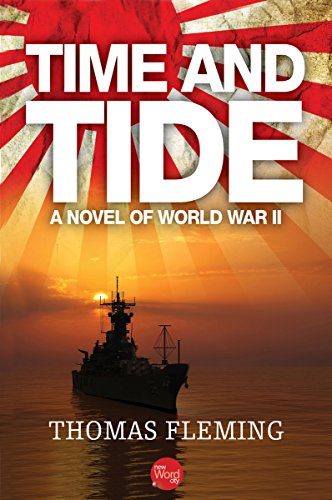
Time and Tide: A Novel of World War II (The Thomas Fleming Library)
Description
From Publishers Weekly Fleming's astonishing gift for portraying the gut realities of war experience in a vast, historically accurate context, clearly evidenced in his bestselling The Officers' Wives, shines forth in this battleship of a novel about the Pacific conflict of WW II, a conflict largely forgotten and (so Fleming's research convinces us) partially covered up. The main focus is on the fictitious USS Jefferson City (modeled on a real-life counterpart), which sailed away from the battle of Savo Island, the biggest defeat in U.S. naval history, and is now fighting to redeem its honor under a man who is the dismissed captain's best friend. Captain McKay probes the mystery of his friend's disgrace while simultaneously seeking to free his ship of its "bad joss" in searing naval confrontations and to overcome his disillusion with the Navy and with a wife who seems the embodiment of its system. There are several eye-openers: the mediocrity of the American admirals at Guadalcanal, and in the earlier phase of the war generally; ordinary sailors' anger at FDR and the politicians for pitting them against the Japanese with inadequate ships and planes; onboard homosexuality, and the Navy's short way with it; the wildness of liberty in Australia; the demoralizing effects of the kamikaze attacks; and the Navy's resentment of the atomic bomb for depriving it of its victory. The numerous memorable characters include a stalwart boatswain, a bullying, homosexual boatswain's mate, a cowardly executive officer, a chaplain whose platitudes are scorched away in the fire of experience, McKay himself and the two women in his life. The story is high drama, grim in detail, prevailingly bitter in tone, about men forced by the hell of war to fight for their honor, their lives and, in selected instances, their souls. It's also a very close look at the U.S. Navy as it is and was. Major ad/promo; Military Book Club selection; Literary Guild alternate. Copyright 1987 Reed Business Information, Inc. --This text refers to an out of print or unavailable edition of this title. From Library Journal Having left the Battle of Savo Island under suspicious circumstances in 1942, the USS Jefferson City is a ship haunted by bad joss. Arthur McKay is sent to relieve the cruiser's captain, Win Kemble, also his Annapolis roommate and best friend. Accused of cowardice under fire, the men of the JC fight a constant battle to prove their valor to themselves and the rest of the Navy. They see action from Guadalcanal to Okinawa, losing all sense of time or season as they wage an interminable war. With a myriad of characters, this is a maritime Upstairs, Downstairs, detailing the personal lives, loves, and conflicts of those aboard. The reader experiences first-hand life on an American warship. A well-researched and moving historical novel. Literary Guild featured alternate; Military Book Club main selection. Maria A. Perez-Stable, Western Michigan Univ. Libs., KalamazooCopyright 1987 Reed Business Information, Inc. --This text refers to an out of print or unavailable edition of this title.
Features & Highlights
- Time and Tide begins with the Navy cruiser, Jefferson City, looming out of the dawn, fleeing a night of terror and death, the bodies of crewmen floating in water-filled compartments below decks. She has deserted her sister ships at the Battle of Savo Island - the worst naval defeat in U.S. history.New York Times bestselling author Thomas Fleming personalizes the war in the Pacific in this compelling novel of intrigue, love, and honor set aboard the fictional USS Jefferson City. From the night battles off Guadalcanal to the kamikaze-ridden skies of Okinawa, Time and Tide contrasts the horrors of war with the passions of love in this epic tale of Americans on the cutting edge of history.




